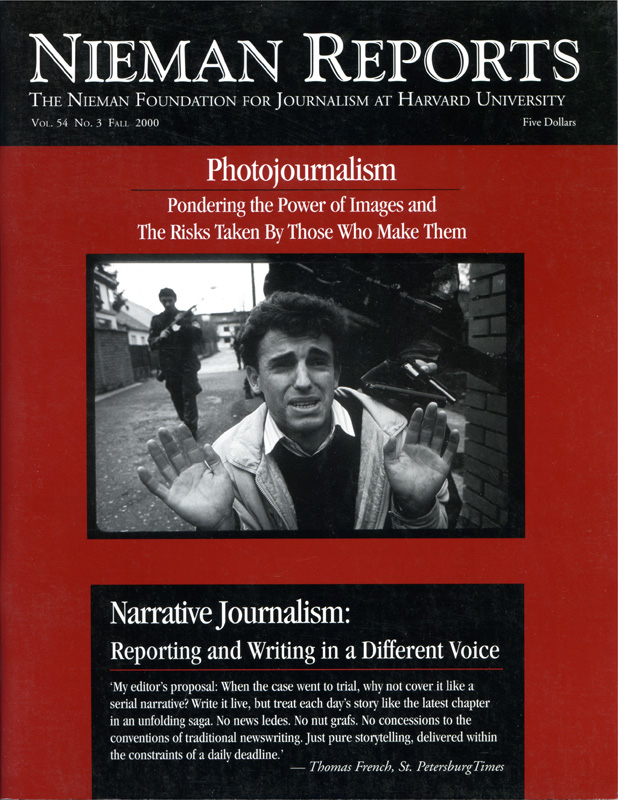A new section called “Narrative Matters” began appearing last summer in Health Affairs, a bimonthly policy journal. As Founding Editor John K. Iglehart wrote, “I never regarded publishing material that emphasizes the personal, the subjective, and the autobiographical as its reason for being. But through a confluence of factors, I have come to believe that we could enrich the journal by nurturing a form of health policy writing that affords greater opportunity for new voices to contribute to future debates.” In its July/August 1999 issue, Fitzhugh Mullan, a physician and clinical professor of pediatrics and public health at the George Washington University and staff physician at the Upper Cardozo Community Health Center, introduced the new section with an essay entitled “Me and the System: The Personal Essay and Health Policy.” Mullan now serves as the editor of “Narrative Matters.” Excerpts from his essay follow.
The personal essay as a policy piece has a strong tradition in medicine. Atul Gawande, writing “When Doctors Make Mistakes” this year in The New Yorker, and David Hilfiker, writing “Facing Our Mistakes” in the New England Journal of Medicine some years ago, raise the difficult and troubling issues about physicians’ shortcomings as seen in their own practices. The eloquence of these candid reflections and the fact that this is an area about which few physicians write combine to make these narratives classics.
Natural as it might seem as an art form, the writing of the personal narrative is not without hazards. Its very spontaneity can be a problem. To work, the essay must be an intimate document in which the writer shares observations and thoughts with candor. Yet our own spontaneous inner voices do not always make good copy. They can wander, suffer from mean-spiritedness or naieveté, groan under the load of ego, or arrive on the page as trivial despite our previous belief that they were visionary. This problem is compounded because the personal essayist writes not only about himself but about other people. The essayist must find a voice that is candid enough to sustain the personal quality but is simultaneously fair to others involved in the story—patients, spouses, family and colleagues. Calibrating the role of the “I” in the first person is difficult as well. First-person narratives are effective because the reader wants to see inside the life of another person, to compare lots, to identify with or, on occasion, reject being identified with the writer. Yet “I” and “me” can easily become oppressive, turning the reader off and undercutting both the art and the import of the piece. The best first-person essays are unobtrusively first person, creating a comfortable atmosphere for the reader where the message of the narrative is not obscured by the personality of the messenger.
The Power of Anecdote
Writing about one’s own experience is an exercise in subjectivity. The very power of the personal essay comes from the view of the world as seen through the eyes of the writer who is unapologetically the arbiter of fact and significance in the narrative. The circumstances reported and the valence they are given are the sole and unchallenged domain of the writer. Anecdote, attitude, prejudice, and point of view are prominent and important components of the personal essay. Although personal observation holds a time-honored place in the history of science, the subjective characteristics of the personal essay are not prominent values in the science of today, nor are they part of the growing efforts in the field of health policy to make decisions based on quantitative measures. Terms such as “evidence-based” and “data-driven” are the coin of the policy world today, and “the anecdote” as evidence is as much demeaned in policy circles as it is in clinical medicine. Yet, important as the arguments are for the use of quantitative science to inform clinical and policy decisions, the anecdote—the report of life events from an unabashedly subjective vantage point—remains a powerful tool for focusing the human mind. The historian and health policy commentator Dan Fox is fond of saying that, for better or worse, “The plural of anecdote is policy….”
The question then may well be asked about the appropriateness of the personal narrative, with its cargo of subjectivity, in a health policy journal. Health care—giving it, getting it, administrating it, teaching it—is a realm of human enterprise that is often personal, frequently dramatic, and always laced with controversy. It is a rich domain for chroniclers who draw on the personal and the subjective—fiction writers, TV producers, and cinematographers—as well as for the writer of the first-person narrative. The personal narrative is indisputably a compelling vehicle for transporting perspective and opinion about health policy issues. The first-person essay, in fact, can lend perspective and vitality to issues that are appropriately and simultaneously being explored and written about in a quantitative and analytic fashion. Personal reflections can add dimension and depth that will make the issue both more lucid and more interesting. The challenge for a journal whose principal product is analytic and not literary is to find writers who can steer their way between the hazards of ego and introspection on the one hand and pure editorializing on the other….
Human beings have always had stories—and always will. Health (and health policy) is a quintessentially human realm, and its stories are as vivid and revealing as those from any area of human endeavor. Even as we move to put decision-making in health on a firmer, more quantitative basis, our stories can help to maintain perspective and promote wisdom. That is the mission of “Narrative Matters.”
Published by Health Affairs, Volume 18, Number 4, pages 118-124. © 1999.


